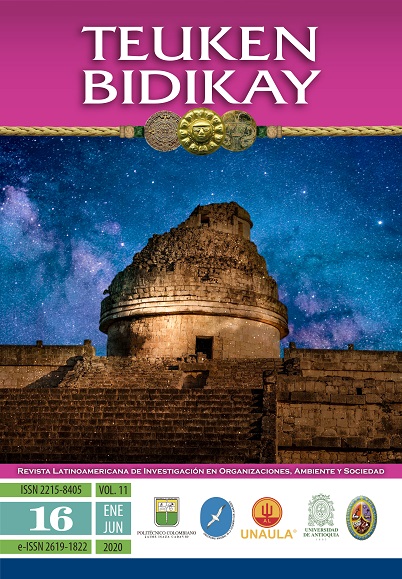The incorporation of Mexico to the new digital industry. Potential for automatable jobs and socio-economic and educational conditions.
DOI:
https://doi.org/10.33571/teuken.v11n16a5Keywords:
automated jobs forecast, educational training and empowerment for the digital economy, quality and relevance of educationAbstract
Given the characteristics and scope of the Digitalization, this paper reviews some relevant indicators of the educational status of the country. The objective is to think about on the qualification of Mexicans to join this new industry. It shows the weakness of it, caused by the low level of education of the population and the lack of quality and relevance of education. Lines of action are proposed for the different levels of educational training, in order to facilitate the development of the skills that are now demanded.
The article was prepared based on documents from international organizations and consultancies and from official national sources regarding the national education system and the results of its evaluation.
Article Metrics
Abstract: 503 PDF (Español (España)): 404PlumX metrics
References
AfDB, ADB, BID, EBRD (African Development Bank Group, Asian Development Bank, Banco Interamericano de Desarrollo, European Bank for Reconstruction and Development). (2018). El futuro del trabajo: perspectivas regionales. Washington, DC: AfDB, ADB, BID, EBRD.
ANUIES. (2018). Visión y acción 2030. Propuesta de la ANUIES para renovar la educación superior en Méjico. Diseño y concertación de políticas públicas para impulsar el cambio institucional, Méjico: ANUIES.
BARRET, James Rodman. (2014). Nuestra invensión final: la inteligencia artificial y el fin de la era humana. 1ª ed. Méjico: Paidos. 334 pp.
BRYNJOLFSSON, Erik and MCAFEE, Andrew Paul. (2014). The Second Machine Age: Work, Progress and Prosperity in a Time of Brilliant Technologies,. Nueva York: W.W. Norton & Company. 320pp.
CEPAL (Comisión Económica para América Latina y el Caribe). (2018a). Datos, algoritmos y políticas: la redefinición del mundo digital, (LC/CMS1.6/4), Santiago de Chile: NACIONES UNIDAS.
CEPAL (Comisión Económica para América Latina y el Caribe). (2018b). Estado de la Banda Ancha en América Latina y el Caribe, 2017, (LC/TS.2018/11), Santiago de Chile: NACIONES UNIDAS.
COX, Alistair. (2019). 4 carreras del futuro que los jóvenes mexicanos no estudian. Dinero en Imagen. https://www.dineroenimagen.com/management/4-carreras-del-futuro-que-los-jovenes-mexicanos-no-estudian/96896. Consultado: 18.03.2019.
DELOITTE GLOBAL y GBCE (Global Business Coalition for Education). (2018). Preparing tomorrow´s workforce for the Fourth Industrial Revolution. For business: A framework for action. Disponible en Internet: https://www2.deloitte.com/content/dam/Deloitte/global/Documents/About-Deloitte/gx-preparing-tomorrow-workforce-for-4IR.pdf . Consultado: 18.03.19.
DELOITTE INSIGHTS. (2017). Forces of change: Industry 4.0. A Deloitte Series on Industry 4.0. Disponible en internet: https://www2.deloitte.com/us/en/insights/focus/industry-4-0/overview.html. Consultado: 22.03.19
FORD, Martin. (2016). El ascenso de los Robots. La amenaza de un futuro sin empleo. 1ª ed. Méjico: Paidos. 398 pp.
FREY, Carl Benedikt y OSBORNE, Michael A. (2013). “The Future of Employment: How Susceptible are Jobs to Computerization?” Working Paper. Oxford Martin School, University of Oxford, Oxford. Disponible en Internet: https://www.oxfordmartin.ox.ac.uk/publications/the-future-of-employment/. Consultado: 13.02.19.
HAYS (2019). www.hays.com.mx. Consultado: 22/03/2019.
MÉJICO. Gobierno de la República. (2018). Informe nacional voluntario para el foro político de alto nivel sobre desarrollo sostenible. Bases y fundamentos en Méjico para una visión del desarrollo sostenible a largo plazo. Avance en el cumplimiento de la Agenda 2030 y los Objetivos de Desarrollo Sostenible, Ciudad de Méjico: Gobierno de los Estados Unidos Mexicanos.
MÉJICO. Instituto Nacional para la Evaluación de la Educación – INEE. (2018a). Evaluaciones al Sistema Educativo Nacional 2013-2018. Suplemento de la Gaceta de la Política Nacional de Evaluación Educativa en Méjico. Año 4, No. 11, julio-octubre 2018.
MÉJICO. Instituto Nacional para la Evaluación de la Educación – INEE.. (2018b). Panorama educativo de Méjico 2017. indicadores del sistema educativo nacional educación básica y media superior. Méjico: INEE. 569 pp.
MÉJICO. Instituto Nacional para la Evaluación de la Educación – INEE.. (2018c). Plan Nacional para la Evaluación de los Aprendizajes (PLANEA). Documento rector. México: INEE. 27 pp.
MËJICO. Presidencia de la República. (2018). Anexo estadístico del Sexto Informe de Gobierno 2017-2018, Méjico: Gobierno de los Estados Unidos Mexicanos
MANPOWER GROUP. (2018). Resolviendo la escasez de talento: Crear, adquirir, tomar prestado y construir puentes. Disponible en Internet: : http://www.manpowergroup.com.mx. Consultado: 15.05.19.
Mc KINSEY GLOBAL INSTITUTE. (2018). Skill Shift: Automation and the future of the workforce. Discussion Paper. may Nueva York: McKinsey&Company. 73 pp.
OCDE. (2018), Perspectivas de la OCDE sobre la Economía Digital 2017, Asociación Mejicana de Internet, Mexico City, https://doi.org/10.1787/9789264302211-es.
OCDE. (2016). PISA 2015 Results (Volume I): Excellence and Equity in Education, PISA, OECD Publish, Paris, https://doi.org/10.1787/9789264266490-en.
OPPENHEIMER, Andrés. (2018). ¿Sálvese quien pueda! El futuro del trabajo en la Automatización. 1ra edición. Miami: Penguin Random House.Grupo Editorial. 448 pp.
SCHWAB, Klaus Martin. (2017). La cuarta revolución industrial. 1ª ed. Méjico: Penguin Random House. 216 pp.
SMIT, Jan, KREUTZER, Stephan, MOELLER, Carolin y CARLBERG, Malin. (2016). Industry 4.0. Directorate General for Internal Policies. European Parliament. Disponible en internet: http://www.europarl.europa.eu/studies. Consultado: 15.02.19.
WEF (World Economic Forum). (2017). The Global competitiveness report. 2017-2018. Insight report. Geneva: World Economic Forum.
WEF (World Economic Forum). (2018). The Future of Jobs report 2018. Geneva: World Economic Forum.

























